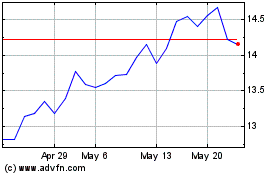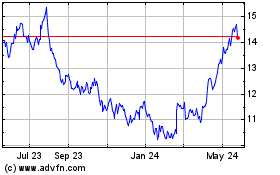Asian Shares Trade Higher Following Banner Day in the U.S.
23 November 2016 - 2:20PM
Dow Jones News
Asian shares traded in positive territory Wednesday, taking a
lead from record gains in the U.S. overnight that were driven by
continuing post-election exuberance.
The S&P/ASX 200 was recently up 0.9% and South Korea's Kospi
gained 0.3%. Japanese markets were closed for a public holiday.
The Dow Jones Industrial Average on Tuesday closed above 19,000
for the first time. It ended the day 0.4% higher at 19,023.87
points. The S&P 500 was up 0.2%.
Hong Kong's Hang Seng Index rose 0.4% Wednesday, the Shanghai
Composite was 0.3% higher and Taiwan's Taiex was up 0.5%.
While traders initially reacted badly to the prospect of a
Donald Trump presidency—particularly in Asia, where he is seen as
being skeptical of free-trade pacts—investors are coming around to
the view that his aggressive stimulus plans will counter most
negatives.
"The market views have changed," said Ric Spooner, chief market
analyst at CMC Markets in Sydney. "The overriding sentiment is that
[initial] misgivings about a Trump presidency are being offset by
expectations that he has proposed a fiscal stimulus."
Mr. Trump has promised to increase spending on infrastructure,
which would lift global prices for steel and cement. Demand for
commodities, especially copper, would also benefit, Mr. Spooner
said.
In Australia, miners BHP Billiton and Rio Tinto gained 2.7% and
2.2% respectively while Korean steelmaker and miner Posco added
1%.
Prices of copper, nickel and zinc were trading higher on the
London Metal Exchange, according to FactSet data.
Average growth in the U.S. is expected to rise to 2.2% in 2017
from 1.5% in 2016, Deutsche Bank Wealth Management said in a note
Wednesday.
U.S. home buying activity rose in October for the second
straight month to a new cyclical high, an indication of robust
demand. October sales of previously owned homes rose at the
strongest pace since February 2007.
Elsewhere, traders were watching an interest-rate decision from
the Malaysian central bank. Bank Negara Malaysia is expected to
hold its policy rate at 3% as the recent weakening of the ringgit
has crimped its headroom in spite of a benign inflation
outlook.
Write to Kenan Machado at kenan.machado@wsj.com
(END) Dow Jones Newswires
November 22, 2016 22:05 ET (03:05 GMT)
Copyright (c) 2016 Dow Jones & Company, Inc.
Hang Seng Bank (PK) (USOTC:HSNGY)
Historical Stock Chart
From Nov 2024 to Dec 2024

Hang Seng Bank (PK) (USOTC:HSNGY)
Historical Stock Chart
From Dec 2023 to Dec 2024
